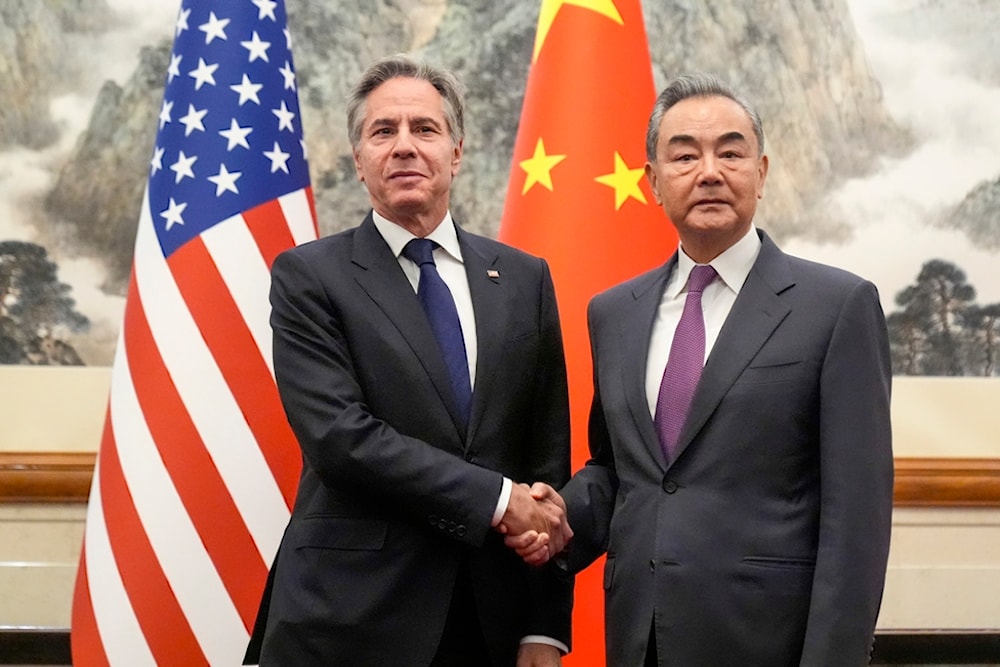'Negative factors' growing in US-China relations despite stability
The foreign ministers of China and the US discuss Russia, Taiwan, and bilateral relations related to economic development, while expressing concern for US economic and political interference in the region.
-

US Secretary of State Antony Blinken, left, meets with China's Foreign Minister Wang Yi at the Diaoyutai State Guesthouse, Friday, April 26, 2024, in Beijing, China. (AP)
The United States is obstructing China's development, Chinese Foreign Minister Wang Yi declared on Friday during a meeting with US Secretary of State Antony Blinken.
Blinken headed to China on a diplomatic visit to discuss several key topics such as enhancing bilateral relations, as well as regional and global matters that the US perceives as concerning, and further discuss issues pertaining to responsibly managing competition to avert a possible miscalculation or conflict.
During the opening session between both officials, Wang Yi affirmed that the current diplomatic relationship between China and the US was stable, but still encompassed growing "negative factors".
"China's legitimate development rights have been unreasonably suppressed and our core interests are facing challenges," he explained.
In response, Blinken stated that the way forward with Presidents Biden and Xi Jinping's agenda was through "active diplomacy", which allows the US to recognize its differences with China to reportedly avoid miscalculations.
Ahead of talks, US Treasury Secretary Janet Yellen expressed the US' aversion to taking options off the table in terms of responding to China's growing industrial capacity.
Yellen conveyed to Reuters Next during an interview in Washington that China achieving full employment through exporting is not deemed acceptable by the global community.
On Russia and the Asia-Pacific
Blinken was also set to persuade China to cut alleged support for Russia's defense industrial base amid the war in Ukraine, and make the case that the implications of China's alleged support for Russia are not in "China's interest going forward."
It was reported that the US claims that China's support for Russia risks magnifying the Chinese-US conflict.
The contentious South China Sea remains a source of tension, and the US is keen on witnessing further advancements in limiting China's provision of the chemicals essential for producing fentanyl.
Wang reiterated China's stance, asserting that the US should refrain from crossing its "red lines" concerning sovereignty, security, and developmental concerns – alluding to Taiwan, as well as the contested South China Sea.
It is worth noting that the US and China have both engaged in extensive talks to enhance military communication to prevent miscalculations.
China warns of US plans to deploy ballistic missiles in Asia-Pacific
This comes amid the United States' decision to deploy ballistic missiles in the Asia-Pacific region and China's announcement of resolute countermeasures.
Chinese Defense Ministry spokesperson Wu Qian told reporters on Thursday that his country "strongly opposes the deployment of US intermediate-range missiles in the Asia-Pacific region, this position is clear and consistent."
He also warned that Washington's move poses a serious threat to the stability and peace in the region.
A US Army Pacific spokesperson told Sputnik earlier this month that the US is working to deploy a medium-range missile system in the Asia-Pacific by the end of 2024.
China's US embassy said in early April that the US must refrain from introducing bloc confrontation, conflict, and turmoil to the Asia-Pacific, confirming that "China is firmly opposed to it."
Read more: China has no intention to engage in Cold, Hot War: Senior official

 3 Min Read
3 Min Read









